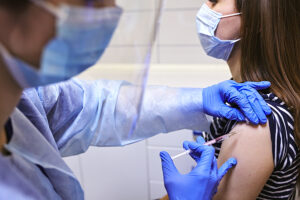As the Delta variant is galloping through the US, the question comes up “are booster vaccines necessary for Covid-19 prevention”.
The CDC ruled in the week of August 9, 2021 that immunocompromised people should receive a third dose of the Pfizer or Moderna vaccine. The Gamma globulin levels in the blood of immunocompromised people who have been vaccinated twice is dropping. However, in people with a normal immune system there is no sign of a weakening immune response in vaccinated people within 8 months. A study done by Pfizer indicates though that antibody levels are also slowly dropping. The recommendation in an application by Pfizer to the FDA was to give a third vaccination of the same vaccine 6 to 12 months following the second shot. A pilot study showed that after a third injection the antibody level was much higher than following the first or second injection.
Johnson & Johnson vaccine
There are nearly 14 million people in the US who received a vaccination with the Johnson & Johnson vaccine. There is a study by Johnson & Johnson that showed by 8 months following a single injection that the antibody levels were still satisfactory. The study is continuing. Any possible recommendations regarding the mRNA vaccines from Pfizer/Moderna do not apply to the Johnson & Johnson vaccinated people. Dr. William Schaffner is Professor of Medicine at the Vanderbilt University School of Medicine, Nashville, Tennessee. He is also Professor of Preventive Medicine in the Department of Health Policy. He said about the Johnson & Johnson vaccine: “Our J&J patients have not been overlooked or neglected. It’s just the way the data are coming in”. He said that in due time the data will indicate whether or not these people will also need a booster vaccine with a second Johnson & Johnson vaccine.
Booster vaccination with other vaccines
According to the Centers for Disease Control and Prevention we need booster shots for tetanus, diphtheria and pertussis (whooping cough) every 10 years. The vaccine has the name TDaP. Above the age of 50 it is wise to receive a booster shot for shingles. Adults above the age of 65 get pneumonia more often. Physicians recommend to get a pneumococcal polysaccharide vaccine (PPSV23), which protects against 23 strains of pneumonia bacteria. Many of us obtain a yearly flu shot every fall containing the latest flu strains. This protects us from complications of the flu including hospitalization for viral pneumonia. Covid-19 is a new pandemic. Detailed information is in flux. The newer clinical trials indicate that booster shots beyond the two initial Pfizer/Moderna shots and the one J&J shot may be necessary. In the coming up months the FDA and CDC will update us on further directions regarding booster shots.
Conclusion
Ongoing clinical trials following the Pfizer vaccination indicated that antibody titers experienced a decrease over time. This is the case for people vaccinated with two Pfizer vaccines. The CDC ruled already in the week of August 9, 2021 that immunocompromised people should receive a third dose of the Pfizer vaccine. The clinical trial with Moderna is not quite at the point where they can release a statement. Similarly, with regard to the Johnson & Johnson vaccine the antibody levels at this point seem to be satisfactory. We need to await future results for further recommendations. Many other standard vaccines require booster shots from time to time. This is the case for the tetanus shot, which is given every 10 years.
Deteriorating antibody production over time
Preliminary data indicates that the immune system is producing less antibodies 6 to 12 months after the initial vaccination is complete. People with chronic conditions lose their antibodies against Covid-19 faster than people without such problems. Presently the CDC recommends that older people and people with chronic diseases should receive a booster shot against Covid-19. We will soon hear from the CDC whether and when the general public should receive booster shots as well.








Pingback: the continuation of the covid pandemic
Pingback: booster vaccines and what it means to be fully vaccinated